International Social Work Report: Privilege, Oppression, and Theories
VerifiedAdded on 2022/08/15
|10
|3349
|11
Report
AI Summary
This report delves into the core concepts of international social work, focusing on the theories of privilege and oppression and their interplay with intersectionality. The author, drawing from personal experiences in the field, reflects on how these theoretical frameworks shape social work practice and understanding of social issues like gender and disability. The report explores various forms of privilege, including educational racism and heterosexual privilege, and how they can diminish other privileges, illustrated with real-life examples. It also examines oppression as a systematic issue, encompassing personal, structural, and cultural dimensions, and discusses the significance of anti-oppression theory in forming the author's social identity. The application of intersectionality, particularly in the context of discrimination faced by marginalized groups, is also analyzed. The report emphasizes the importance of self-assessment and empathy in social work practice to advocate for social justice and equity.
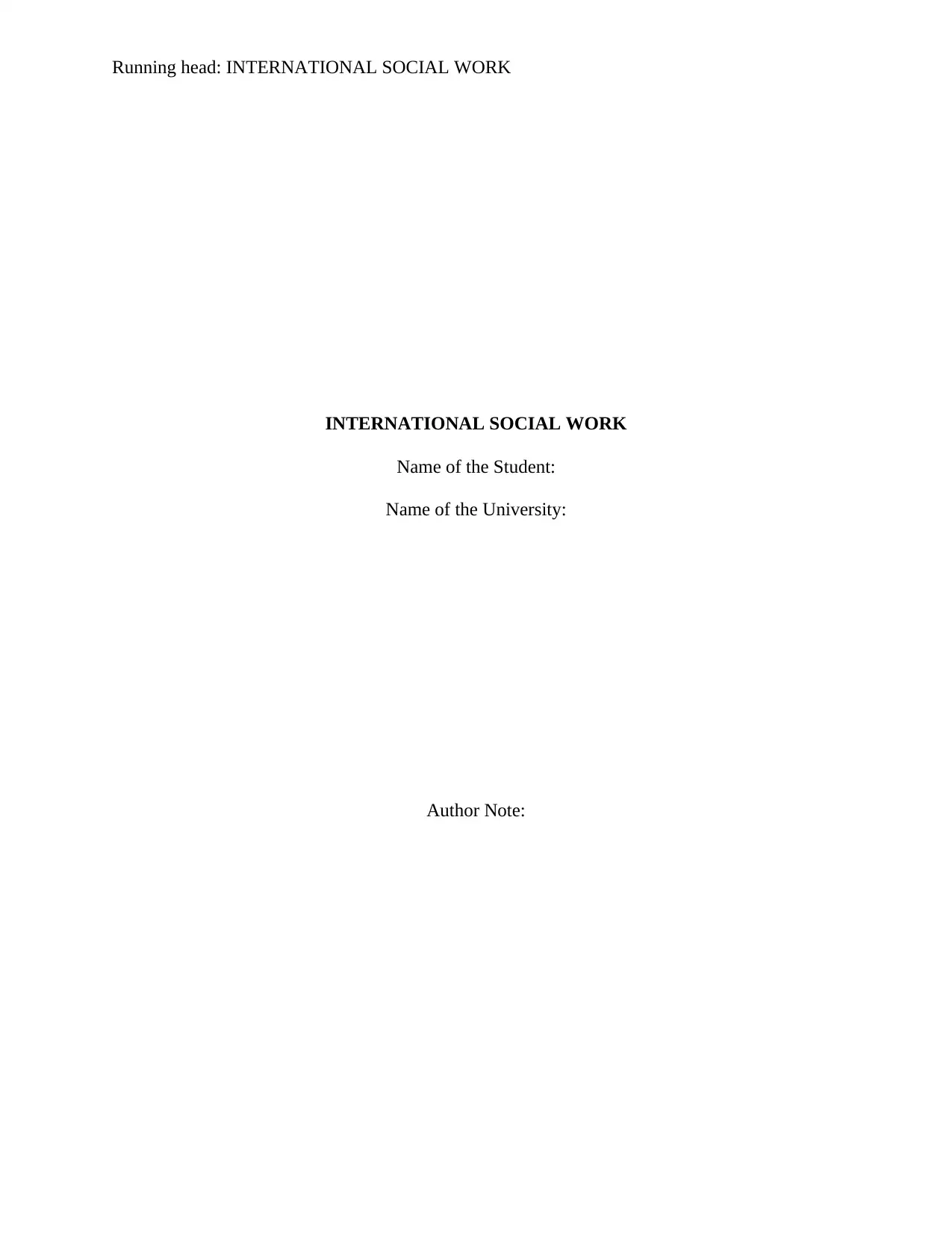
Running head: INTERNATIONAL SOCIAL WORK
INTERNATIONAL SOCIAL WORK
Name of the Student:
Name of the University:
Author Note:
INTERNATIONAL SOCIAL WORK
Name of the Student:
Name of the University:
Author Note:
Paraphrase This Document
Need a fresh take? Get an instant paraphrase of this document with our AI Paraphraser
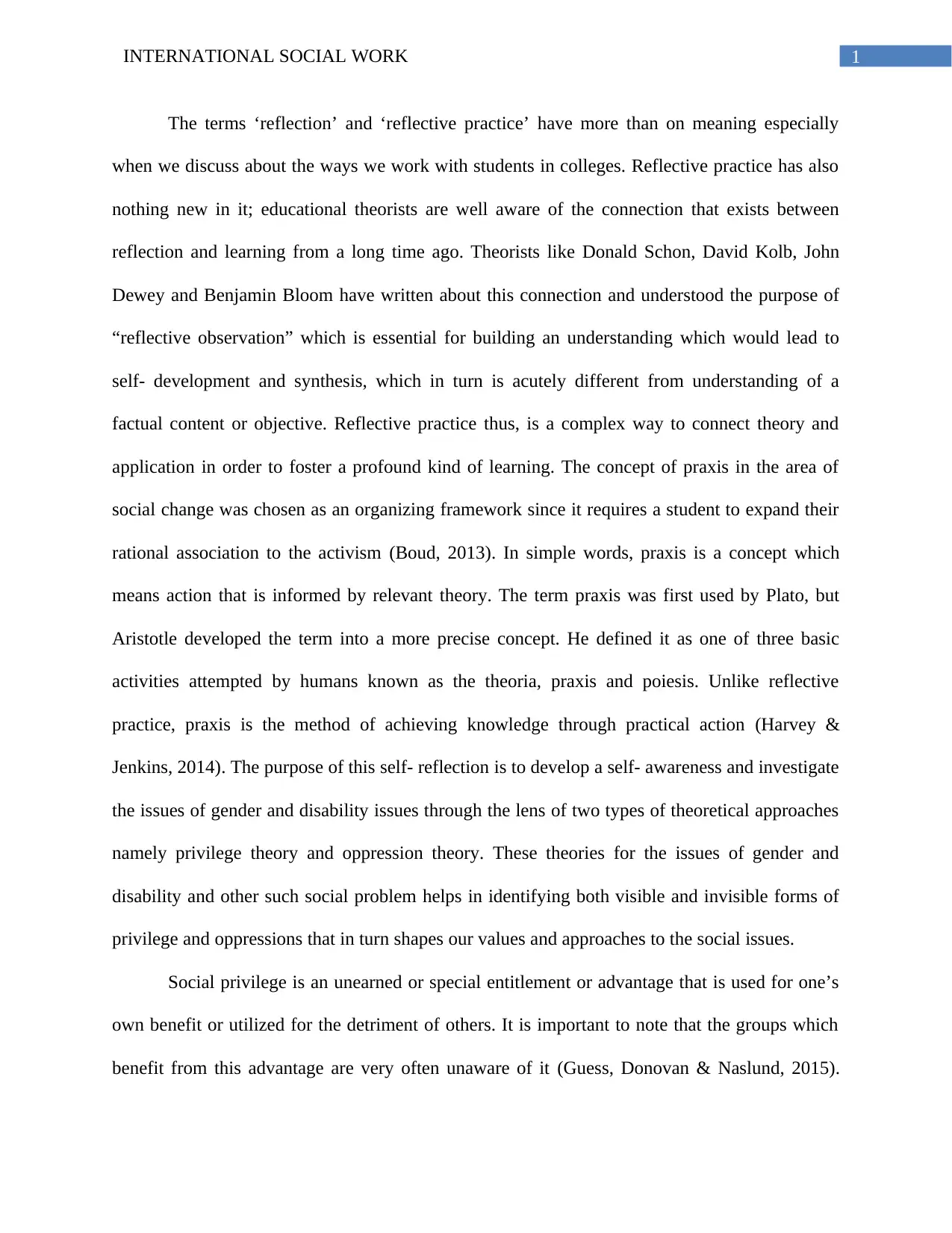
1INTERNATIONAL SOCIAL WORK
The terms ‘reflection’ and ‘reflective practice’ have more than on meaning especially
when we discuss about the ways we work with students in colleges. Reflective practice has also
nothing new in it; educational theorists are well aware of the connection that exists between
reflection and learning from a long time ago. Theorists like Donald Schon, David Kolb, John
Dewey and Benjamin Bloom have written about this connection and understood the purpose of
“reflective observation” which is essential for building an understanding which would lead to
self- development and synthesis, which in turn is acutely different from understanding of a
factual content or objective. Reflective practice thus, is a complex way to connect theory and
application in order to foster a profound kind of learning. The concept of praxis in the area of
social change was chosen as an organizing framework since it requires a student to expand their
rational association to the activism (Boud, 2013). In simple words, praxis is a concept which
means action that is informed by relevant theory. The term praxis was first used by Plato, but
Aristotle developed the term into a more precise concept. He defined it as one of three basic
activities attempted by humans known as the theoria, praxis and poiesis. Unlike reflective
practice, praxis is the method of achieving knowledge through practical action (Harvey &
Jenkins, 2014). The purpose of this self- reflection is to develop a self- awareness and investigate
the issues of gender and disability issues through the lens of two types of theoretical approaches
namely privilege theory and oppression theory. These theories for the issues of gender and
disability and other such social problem helps in identifying both visible and invisible forms of
privilege and oppressions that in turn shapes our values and approaches to the social issues.
Social privilege is an unearned or special entitlement or advantage that is used for one’s
own benefit or utilized for the detriment of others. It is important to note that the groups which
benefit from this advantage are very often unaware of it (Guess, Donovan & Naslund, 2015).
The terms ‘reflection’ and ‘reflective practice’ have more than on meaning especially
when we discuss about the ways we work with students in colleges. Reflective practice has also
nothing new in it; educational theorists are well aware of the connection that exists between
reflection and learning from a long time ago. Theorists like Donald Schon, David Kolb, John
Dewey and Benjamin Bloom have written about this connection and understood the purpose of
“reflective observation” which is essential for building an understanding which would lead to
self- development and synthesis, which in turn is acutely different from understanding of a
factual content or objective. Reflective practice thus, is a complex way to connect theory and
application in order to foster a profound kind of learning. The concept of praxis in the area of
social change was chosen as an organizing framework since it requires a student to expand their
rational association to the activism (Boud, 2013). In simple words, praxis is a concept which
means action that is informed by relevant theory. The term praxis was first used by Plato, but
Aristotle developed the term into a more precise concept. He defined it as one of three basic
activities attempted by humans known as the theoria, praxis and poiesis. Unlike reflective
practice, praxis is the method of achieving knowledge through practical action (Harvey &
Jenkins, 2014). The purpose of this self- reflection is to develop a self- awareness and investigate
the issues of gender and disability issues through the lens of two types of theoretical approaches
namely privilege theory and oppression theory. These theories for the issues of gender and
disability and other such social problem helps in identifying both visible and invisible forms of
privilege and oppressions that in turn shapes our values and approaches to the social issues.
Social privilege is an unearned or special entitlement or advantage that is used for one’s
own benefit or utilized for the detriment of others. It is important to note that the groups which
benefit from this advantage are very often unaware of it (Guess, Donovan & Naslund, 2015).
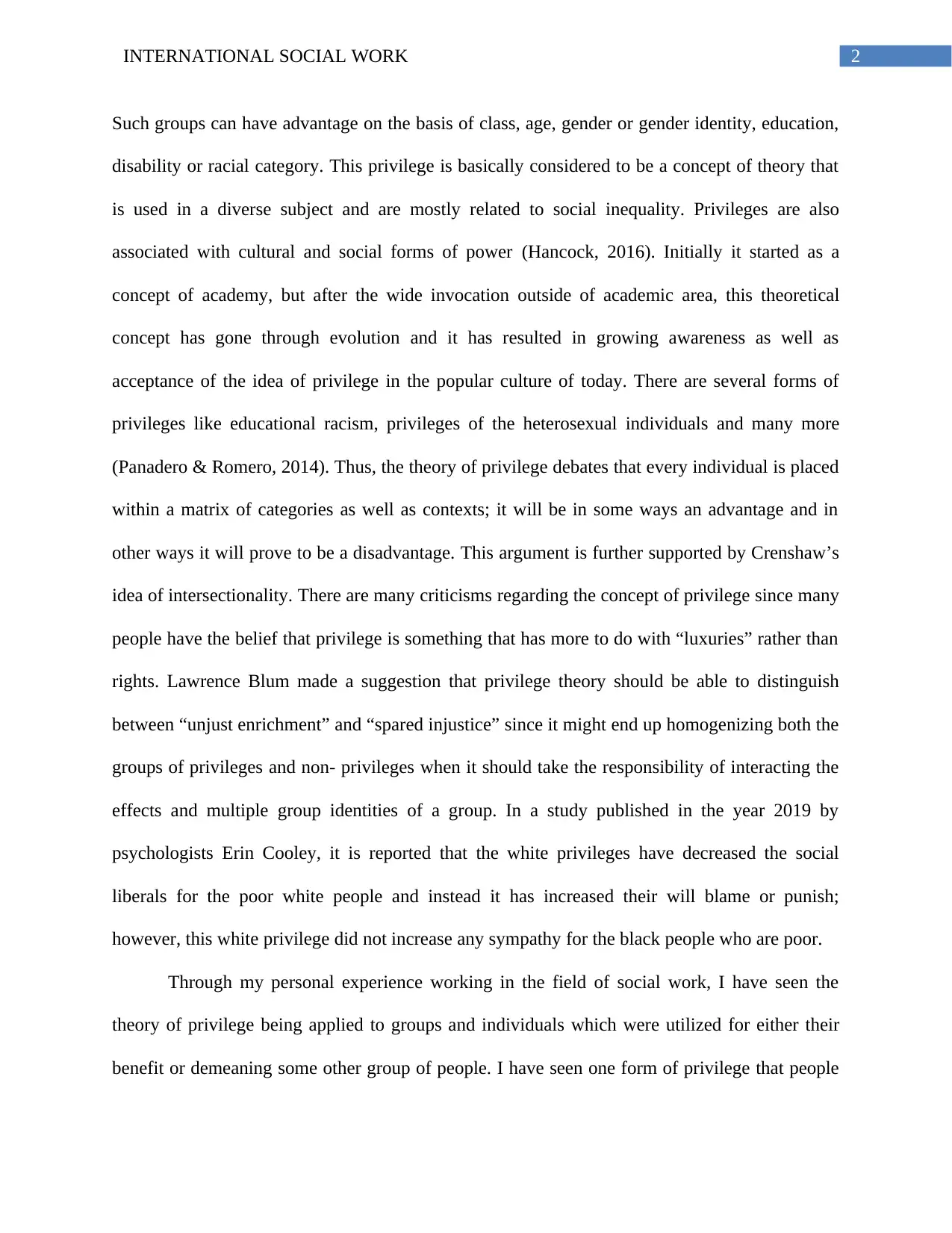
2INTERNATIONAL SOCIAL WORK
Such groups can have advantage on the basis of class, age, gender or gender identity, education,
disability or racial category. This privilege is basically considered to be a concept of theory that
is used in a diverse subject and are mostly related to social inequality. Privileges are also
associated with cultural and social forms of power (Hancock, 2016). Initially it started as a
concept of academy, but after the wide invocation outside of academic area, this theoretical
concept has gone through evolution and it has resulted in growing awareness as well as
acceptance of the idea of privilege in the popular culture of today. There are several forms of
privileges like educational racism, privileges of the heterosexual individuals and many more
(Panadero & Romero, 2014). Thus, the theory of privilege debates that every individual is placed
within a matrix of categories as well as contexts; it will be in some ways an advantage and in
other ways it will prove to be a disadvantage. This argument is further supported by Crenshaw’s
idea of intersectionality. There are many criticisms regarding the concept of privilege since many
people have the belief that privilege is something that has more to do with “luxuries” rather than
rights. Lawrence Blum made a suggestion that privilege theory should be able to distinguish
between “unjust enrichment” and “spared injustice” since it might end up homogenizing both the
groups of privileges and non- privileges when it should take the responsibility of interacting the
effects and multiple group identities of a group. In a study published in the year 2019 by
psychologists Erin Cooley, it is reported that the white privileges have decreased the social
liberals for the poor white people and instead it has increased their will blame or punish;
however, this white privilege did not increase any sympathy for the black people who are poor.
Through my personal experience working in the field of social work, I have seen the
theory of privilege being applied to groups and individuals which were utilized for either their
benefit or demeaning some other group of people. I have seen one form of privilege that people
Such groups can have advantage on the basis of class, age, gender or gender identity, education,
disability or racial category. This privilege is basically considered to be a concept of theory that
is used in a diverse subject and are mostly related to social inequality. Privileges are also
associated with cultural and social forms of power (Hancock, 2016). Initially it started as a
concept of academy, but after the wide invocation outside of academic area, this theoretical
concept has gone through evolution and it has resulted in growing awareness as well as
acceptance of the idea of privilege in the popular culture of today. There are several forms of
privileges like educational racism, privileges of the heterosexual individuals and many more
(Panadero & Romero, 2014). Thus, the theory of privilege debates that every individual is placed
within a matrix of categories as well as contexts; it will be in some ways an advantage and in
other ways it will prove to be a disadvantage. This argument is further supported by Crenshaw’s
idea of intersectionality. There are many criticisms regarding the concept of privilege since many
people have the belief that privilege is something that has more to do with “luxuries” rather than
rights. Lawrence Blum made a suggestion that privilege theory should be able to distinguish
between “unjust enrichment” and “spared injustice” since it might end up homogenizing both the
groups of privileges and non- privileges when it should take the responsibility of interacting the
effects and multiple group identities of a group. In a study published in the year 2019 by
psychologists Erin Cooley, it is reported that the white privileges have decreased the social
liberals for the poor white people and instead it has increased their will blame or punish;
however, this white privilege did not increase any sympathy for the black people who are poor.
Through my personal experience working in the field of social work, I have seen the
theory of privilege being applied to groups and individuals which were utilized for either their
benefit or demeaning some other group of people. I have seen one form of privilege that people
⊘ This is a preview!⊘
Do you want full access?
Subscribe today to unlock all pages.

Trusted by 1+ million students worldwide
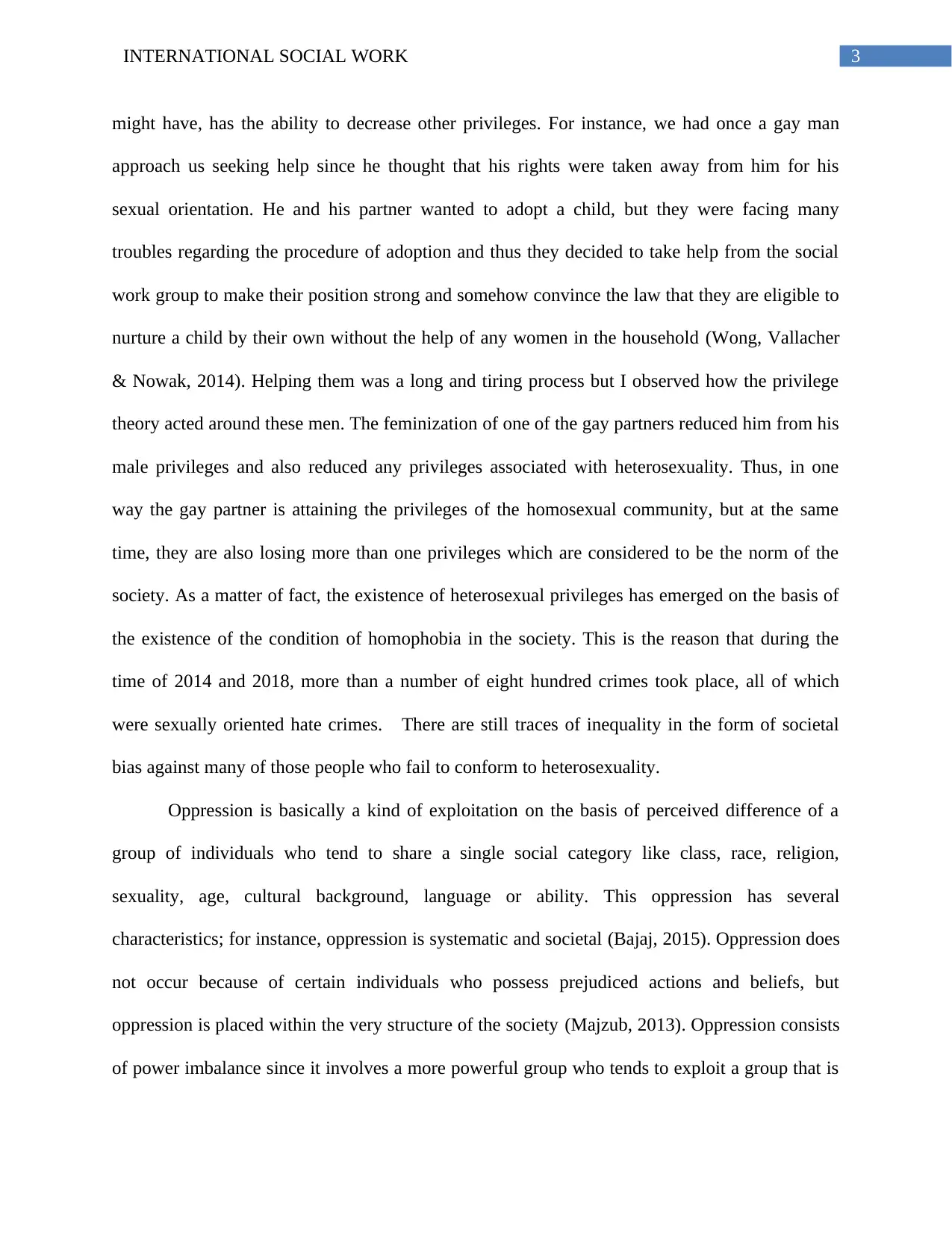
3INTERNATIONAL SOCIAL WORK
might have, has the ability to decrease other privileges. For instance, we had once a gay man
approach us seeking help since he thought that his rights were taken away from him for his
sexual orientation. He and his partner wanted to adopt a child, but they were facing many
troubles regarding the procedure of adoption and thus they decided to take help from the social
work group to make their position strong and somehow convince the law that they are eligible to
nurture a child by their own without the help of any women in the household (Wong, Vallacher
& Nowak, 2014). Helping them was a long and tiring process but I observed how the privilege
theory acted around these men. The feminization of one of the gay partners reduced him from his
male privileges and also reduced any privileges associated with heterosexuality. Thus, in one
way the gay partner is attaining the privileges of the homosexual community, but at the same
time, they are also losing more than one privileges which are considered to be the norm of the
society. As a matter of fact, the existence of heterosexual privileges has emerged on the basis of
the existence of the condition of homophobia in the society. This is the reason that during the
time of 2014 and 2018, more than a number of eight hundred crimes took place, all of which
were sexually oriented hate crimes. There are still traces of inequality in the form of societal
bias against many of those people who fail to conform to heterosexuality.
Oppression is basically a kind of exploitation on the basis of perceived difference of a
group of individuals who tend to share a single social category like class, race, religion,
sexuality, age, cultural background, language or ability. This oppression has several
characteristics; for instance, oppression is systematic and societal (Bajaj, 2015). Oppression does
not occur because of certain individuals who possess prejudiced actions and beliefs, but
oppression is placed within the very structure of the society (Majzub, 2013). Oppression consists
of power imbalance since it involves a more powerful group who tends to exploit a group that is
might have, has the ability to decrease other privileges. For instance, we had once a gay man
approach us seeking help since he thought that his rights were taken away from him for his
sexual orientation. He and his partner wanted to adopt a child, but they were facing many
troubles regarding the procedure of adoption and thus they decided to take help from the social
work group to make their position strong and somehow convince the law that they are eligible to
nurture a child by their own without the help of any women in the household (Wong, Vallacher
& Nowak, 2014). Helping them was a long and tiring process but I observed how the privilege
theory acted around these men. The feminization of one of the gay partners reduced him from his
male privileges and also reduced any privileges associated with heterosexuality. Thus, in one
way the gay partner is attaining the privileges of the homosexual community, but at the same
time, they are also losing more than one privileges which are considered to be the norm of the
society. As a matter of fact, the existence of heterosexual privileges has emerged on the basis of
the existence of the condition of homophobia in the society. This is the reason that during the
time of 2014 and 2018, more than a number of eight hundred crimes took place, all of which
were sexually oriented hate crimes. There are still traces of inequality in the form of societal
bias against many of those people who fail to conform to heterosexuality.
Oppression is basically a kind of exploitation on the basis of perceived difference of a
group of individuals who tend to share a single social category like class, race, religion,
sexuality, age, cultural background, language or ability. This oppression has several
characteristics; for instance, oppression is systematic and societal (Bajaj, 2015). Oppression does
not occur because of certain individuals who possess prejudiced actions and beliefs, but
oppression is placed within the very structure of the society (Majzub, 2013). Oppression consists
of power imbalance since it involves a more powerful group who tends to exploit a group that is
Paraphrase This Document
Need a fresh take? Get an instant paraphrase of this document with our AI Paraphraser
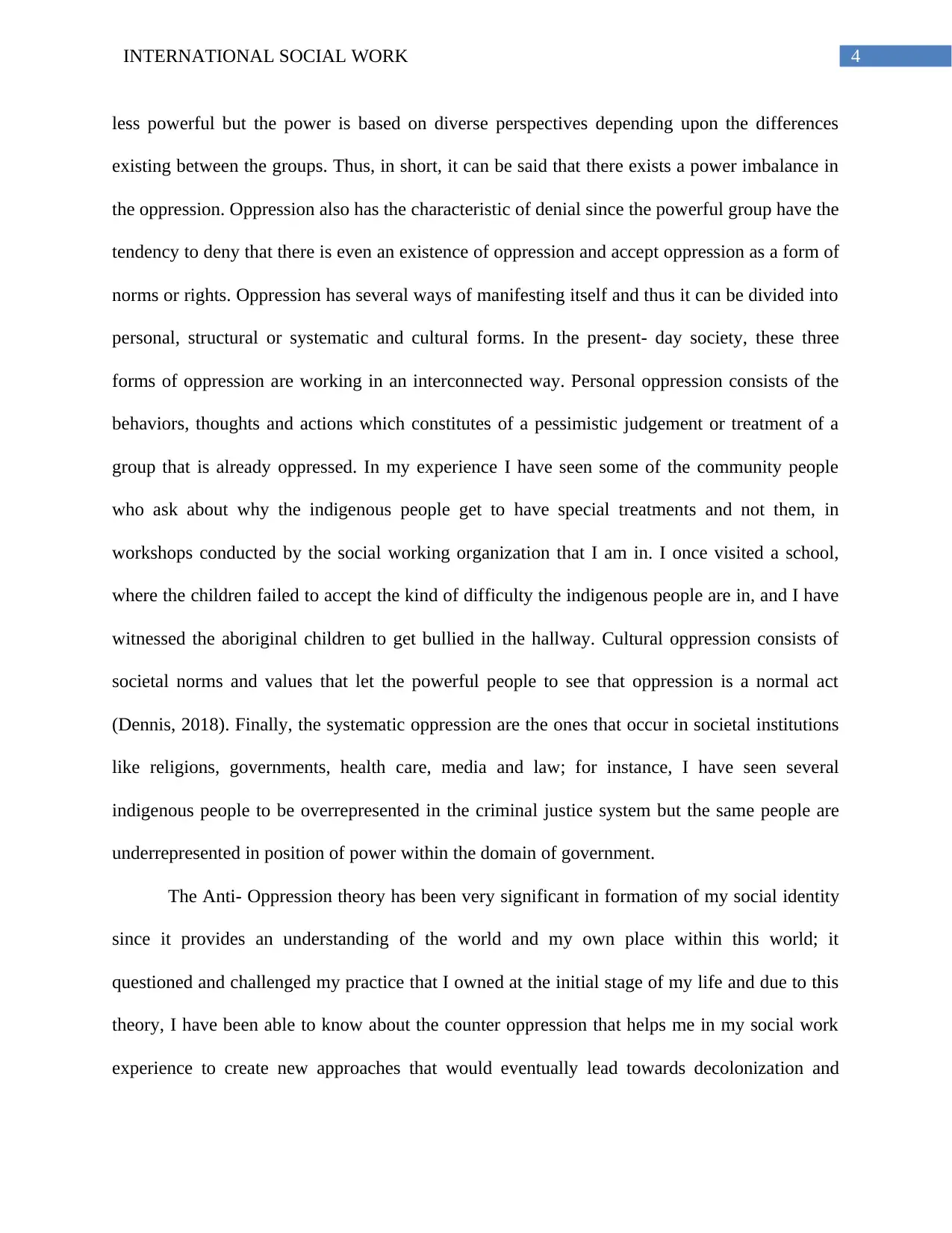
4INTERNATIONAL SOCIAL WORK
less powerful but the power is based on diverse perspectives depending upon the differences
existing between the groups. Thus, in short, it can be said that there exists a power imbalance in
the oppression. Oppression also has the characteristic of denial since the powerful group have the
tendency to deny that there is even an existence of oppression and accept oppression as a form of
norms or rights. Oppression has several ways of manifesting itself and thus it can be divided into
personal, structural or systematic and cultural forms. In the present- day society, these three
forms of oppression are working in an interconnected way. Personal oppression consists of the
behaviors, thoughts and actions which constitutes of a pessimistic judgement or treatment of a
group that is already oppressed. In my experience I have seen some of the community people
who ask about why the indigenous people get to have special treatments and not them, in
workshops conducted by the social working organization that I am in. I once visited a school,
where the children failed to accept the kind of difficulty the indigenous people are in, and I have
witnessed the aboriginal children to get bullied in the hallway. Cultural oppression consists of
societal norms and values that let the powerful people to see that oppression is a normal act
(Dennis, 2018). Finally, the systematic oppression are the ones that occur in societal institutions
like religions, governments, health care, media and law; for instance, I have seen several
indigenous people to be overrepresented in the criminal justice system but the same people are
underrepresented in position of power within the domain of government.
The Anti- Oppression theory has been very significant in formation of my social identity
since it provides an understanding of the world and my own place within this world; it
questioned and challenged my practice that I owned at the initial stage of my life and due to this
theory, I have been able to know about the counter oppression that helps me in my social work
experience to create new approaches that would eventually lead towards decolonization and
less powerful but the power is based on diverse perspectives depending upon the differences
existing between the groups. Thus, in short, it can be said that there exists a power imbalance in
the oppression. Oppression also has the characteristic of denial since the powerful group have the
tendency to deny that there is even an existence of oppression and accept oppression as a form of
norms or rights. Oppression has several ways of manifesting itself and thus it can be divided into
personal, structural or systematic and cultural forms. In the present- day society, these three
forms of oppression are working in an interconnected way. Personal oppression consists of the
behaviors, thoughts and actions which constitutes of a pessimistic judgement or treatment of a
group that is already oppressed. In my experience I have seen some of the community people
who ask about why the indigenous people get to have special treatments and not them, in
workshops conducted by the social working organization that I am in. I once visited a school,
where the children failed to accept the kind of difficulty the indigenous people are in, and I have
witnessed the aboriginal children to get bullied in the hallway. Cultural oppression consists of
societal norms and values that let the powerful people to see that oppression is a normal act
(Dennis, 2018). Finally, the systematic oppression are the ones that occur in societal institutions
like religions, governments, health care, media and law; for instance, I have seen several
indigenous people to be overrepresented in the criminal justice system but the same people are
underrepresented in position of power within the domain of government.
The Anti- Oppression theory has been very significant in formation of my social identity
since it provides an understanding of the world and my own place within this world; it
questioned and challenged my practice that I owned at the initial stage of my life and due to this
theory, I have been able to know about the counter oppression that helps me in my social work
experience to create new approaches that would eventually lead towards decolonization and
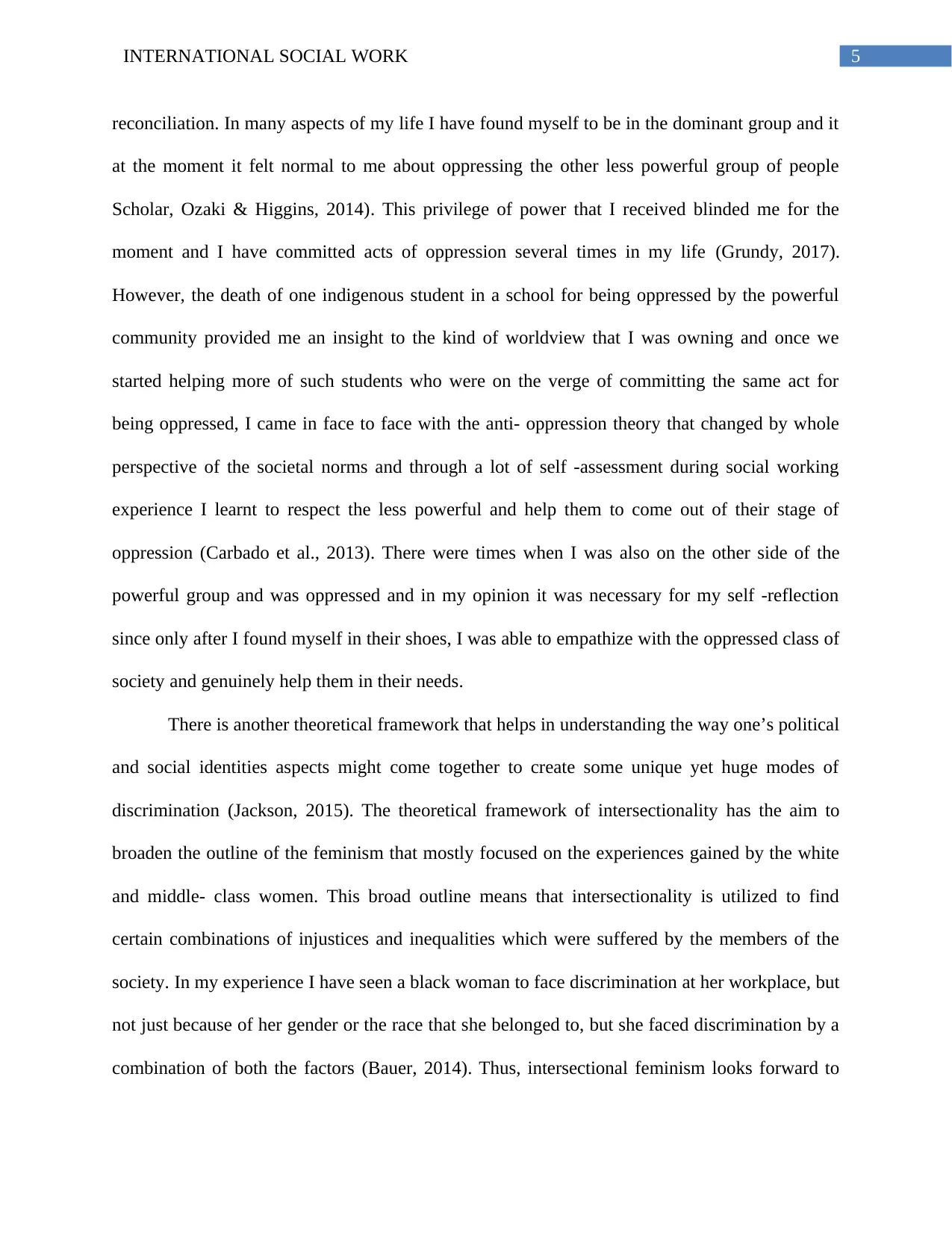
5INTERNATIONAL SOCIAL WORK
reconciliation. In many aspects of my life I have found myself to be in the dominant group and it
at the moment it felt normal to me about oppressing the other less powerful group of people
Scholar, Ozaki & Higgins, 2014). This privilege of power that I received blinded me for the
moment and I have committed acts of oppression several times in my life (Grundy, 2017).
However, the death of one indigenous student in a school for being oppressed by the powerful
community provided me an insight to the kind of worldview that I was owning and once we
started helping more of such students who were on the verge of committing the same act for
being oppressed, I came in face to face with the anti- oppression theory that changed by whole
perspective of the societal norms and through a lot of self -assessment during social working
experience I learnt to respect the less powerful and help them to come out of their stage of
oppression (Carbado et al., 2013). There were times when I was also on the other side of the
powerful group and was oppressed and in my opinion it was necessary for my self -reflection
since only after I found myself in their shoes, I was able to empathize with the oppressed class of
society and genuinely help them in their needs.
There is another theoretical framework that helps in understanding the way one’s political
and social identities aspects might come together to create some unique yet huge modes of
discrimination (Jackson, 2015). The theoretical framework of intersectionality has the aim to
broaden the outline of the feminism that mostly focused on the experiences gained by the white
and middle- class women. This broad outline means that intersectionality is utilized to find
certain combinations of injustices and inequalities which were suffered by the members of the
society. In my experience I have seen a black woman to face discrimination at her workplace, but
not just because of her gender or the race that she belonged to, but she faced discrimination by a
combination of both the factors (Bauer, 2014). Thus, intersectional feminism looks forward to
reconciliation. In many aspects of my life I have found myself to be in the dominant group and it
at the moment it felt normal to me about oppressing the other less powerful group of people
Scholar, Ozaki & Higgins, 2014). This privilege of power that I received blinded me for the
moment and I have committed acts of oppression several times in my life (Grundy, 2017).
However, the death of one indigenous student in a school for being oppressed by the powerful
community provided me an insight to the kind of worldview that I was owning and once we
started helping more of such students who were on the verge of committing the same act for
being oppressed, I came in face to face with the anti- oppression theory that changed by whole
perspective of the societal norms and through a lot of self -assessment during social working
experience I learnt to respect the less powerful and help them to come out of their stage of
oppression (Carbado et al., 2013). There were times when I was also on the other side of the
powerful group and was oppressed and in my opinion it was necessary for my self -reflection
since only after I found myself in their shoes, I was able to empathize with the oppressed class of
society and genuinely help them in their needs.
There is another theoretical framework that helps in understanding the way one’s political
and social identities aspects might come together to create some unique yet huge modes of
discrimination (Jackson, 2015). The theoretical framework of intersectionality has the aim to
broaden the outline of the feminism that mostly focused on the experiences gained by the white
and middle- class women. This broad outline means that intersectionality is utilized to find
certain combinations of injustices and inequalities which were suffered by the members of the
society. In my experience I have seen a black woman to face discrimination at her workplace, but
not just because of her gender or the race that she belonged to, but she faced discrimination by a
combination of both the factors (Bauer, 2014). Thus, intersectional feminism looks forward to
⊘ This is a preview!⊘
Do you want full access?
Subscribe today to unlock all pages.

Trusted by 1+ million students worldwide
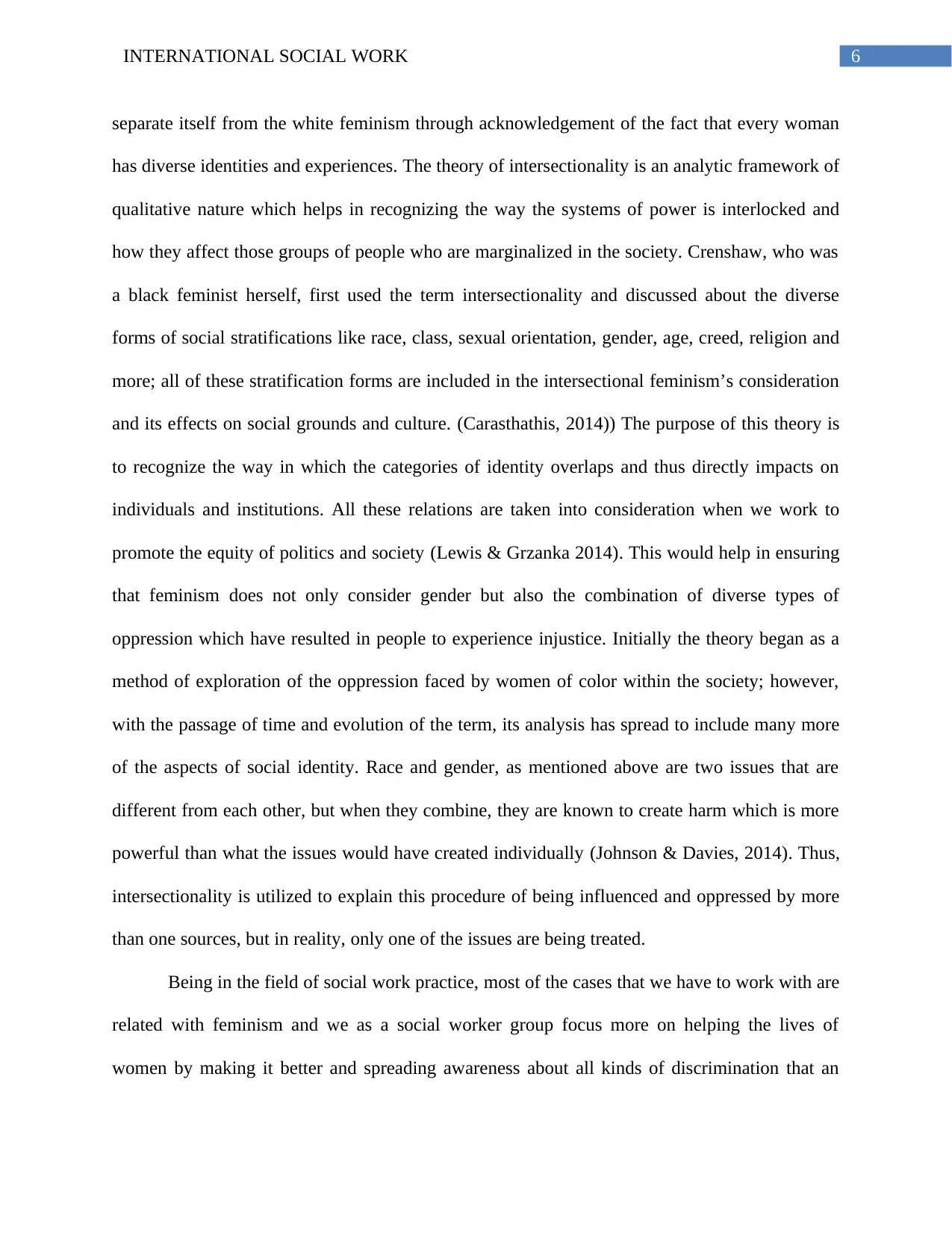
6INTERNATIONAL SOCIAL WORK
separate itself from the white feminism through acknowledgement of the fact that every woman
has diverse identities and experiences. The theory of intersectionality is an analytic framework of
qualitative nature which helps in recognizing the way the systems of power is interlocked and
how they affect those groups of people who are marginalized in the society. Crenshaw, who was
a black feminist herself, first used the term intersectionality and discussed about the diverse
forms of social stratifications like race, class, sexual orientation, gender, age, creed, religion and
more; all of these stratification forms are included in the intersectional feminism’s consideration
and its effects on social grounds and culture. (Carasthathis, 2014)) The purpose of this theory is
to recognize the way in which the categories of identity overlaps and thus directly impacts on
individuals and institutions. All these relations are taken into consideration when we work to
promote the equity of politics and society (Lewis & Grzanka 2014). This would help in ensuring
that feminism does not only consider gender but also the combination of diverse types of
oppression which have resulted in people to experience injustice. Initially the theory began as a
method of exploration of the oppression faced by women of color within the society; however,
with the passage of time and evolution of the term, its analysis has spread to include many more
of the aspects of social identity. Race and gender, as mentioned above are two issues that are
different from each other, but when they combine, they are known to create harm which is more
powerful than what the issues would have created individually (Johnson & Davies, 2014). Thus,
intersectionality is utilized to explain this procedure of being influenced and oppressed by more
than one sources, but in reality, only one of the issues are being treated.
Being in the field of social work practice, most of the cases that we have to work with are
related with feminism and we as a social worker group focus more on helping the lives of
women by making it better and spreading awareness about all kinds of discrimination that an
separate itself from the white feminism through acknowledgement of the fact that every woman
has diverse identities and experiences. The theory of intersectionality is an analytic framework of
qualitative nature which helps in recognizing the way the systems of power is interlocked and
how they affect those groups of people who are marginalized in the society. Crenshaw, who was
a black feminist herself, first used the term intersectionality and discussed about the diverse
forms of social stratifications like race, class, sexual orientation, gender, age, creed, religion and
more; all of these stratification forms are included in the intersectional feminism’s consideration
and its effects on social grounds and culture. (Carasthathis, 2014)) The purpose of this theory is
to recognize the way in which the categories of identity overlaps and thus directly impacts on
individuals and institutions. All these relations are taken into consideration when we work to
promote the equity of politics and society (Lewis & Grzanka 2014). This would help in ensuring
that feminism does not only consider gender but also the combination of diverse types of
oppression which have resulted in people to experience injustice. Initially the theory began as a
method of exploration of the oppression faced by women of color within the society; however,
with the passage of time and evolution of the term, its analysis has spread to include many more
of the aspects of social identity. Race and gender, as mentioned above are two issues that are
different from each other, but when they combine, they are known to create harm which is more
powerful than what the issues would have created individually (Johnson & Davies, 2014). Thus,
intersectionality is utilized to explain this procedure of being influenced and oppressed by more
than one sources, but in reality, only one of the issues are being treated.
Being in the field of social work practice, most of the cases that we have to work with are
related with feminism and we as a social worker group focus more on helping the lives of
women by making it better and spreading awareness about all kinds of discrimination that an
Paraphrase This Document
Need a fresh take? Get an instant paraphrase of this document with our AI Paraphraser
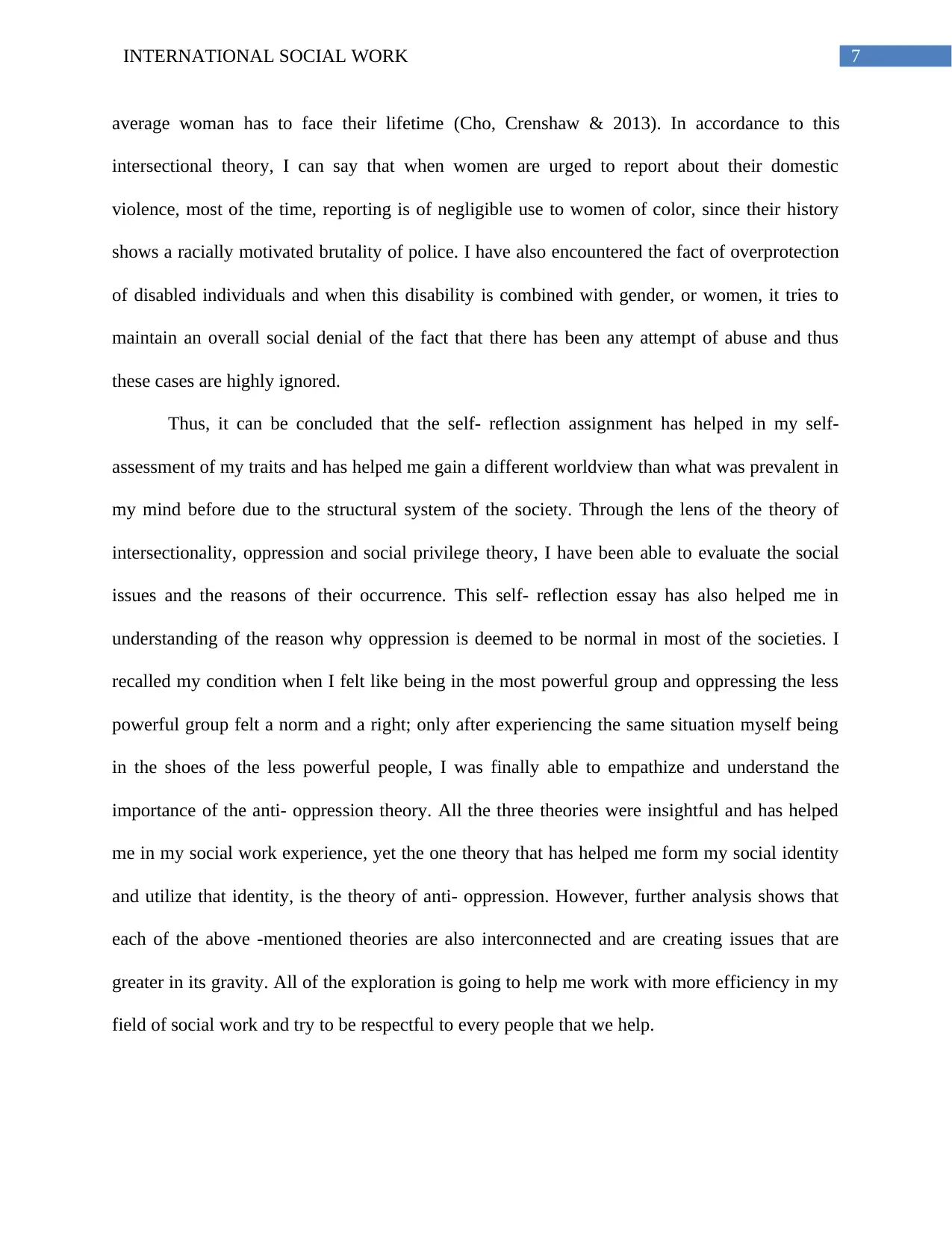
7INTERNATIONAL SOCIAL WORK
average woman has to face their lifetime (Cho, Crenshaw & 2013). In accordance to this
intersectional theory, I can say that when women are urged to report about their domestic
violence, most of the time, reporting is of negligible use to women of color, since their history
shows a racially motivated brutality of police. I have also encountered the fact of overprotection
of disabled individuals and when this disability is combined with gender, or women, it tries to
maintain an overall social denial of the fact that there has been any attempt of abuse and thus
these cases are highly ignored.
Thus, it can be concluded that the self- reflection assignment has helped in my self-
assessment of my traits and has helped me gain a different worldview than what was prevalent in
my mind before due to the structural system of the society. Through the lens of the theory of
intersectionality, oppression and social privilege theory, I have been able to evaluate the social
issues and the reasons of their occurrence. This self- reflection essay has also helped me in
understanding of the reason why oppression is deemed to be normal in most of the societies. I
recalled my condition when I felt like being in the most powerful group and oppressing the less
powerful group felt a norm and a right; only after experiencing the same situation myself being
in the shoes of the less powerful people, I was finally able to empathize and understand the
importance of the anti- oppression theory. All the three theories were insightful and has helped
me in my social work experience, yet the one theory that has helped me form my social identity
and utilize that identity, is the theory of anti- oppression. However, further analysis shows that
each of the above -mentioned theories are also interconnected and are creating issues that are
greater in its gravity. All of the exploration is going to help me work with more efficiency in my
field of social work and try to be respectful to every people that we help.
average woman has to face their lifetime (Cho, Crenshaw & 2013). In accordance to this
intersectional theory, I can say that when women are urged to report about their domestic
violence, most of the time, reporting is of negligible use to women of color, since their history
shows a racially motivated brutality of police. I have also encountered the fact of overprotection
of disabled individuals and when this disability is combined with gender, or women, it tries to
maintain an overall social denial of the fact that there has been any attempt of abuse and thus
these cases are highly ignored.
Thus, it can be concluded that the self- reflection assignment has helped in my self-
assessment of my traits and has helped me gain a different worldview than what was prevalent in
my mind before due to the structural system of the society. Through the lens of the theory of
intersectionality, oppression and social privilege theory, I have been able to evaluate the social
issues and the reasons of their occurrence. This self- reflection essay has also helped me in
understanding of the reason why oppression is deemed to be normal in most of the societies. I
recalled my condition when I felt like being in the most powerful group and oppressing the less
powerful group felt a norm and a right; only after experiencing the same situation myself being
in the shoes of the less powerful people, I was finally able to empathize and understand the
importance of the anti- oppression theory. All the three theories were insightful and has helped
me in my social work experience, yet the one theory that has helped me form my social identity
and utilize that identity, is the theory of anti- oppression. However, further analysis shows that
each of the above -mentioned theories are also interconnected and are creating issues that are
greater in its gravity. All of the exploration is going to help me work with more efficiency in my
field of social work and try to be respectful to every people that we help.
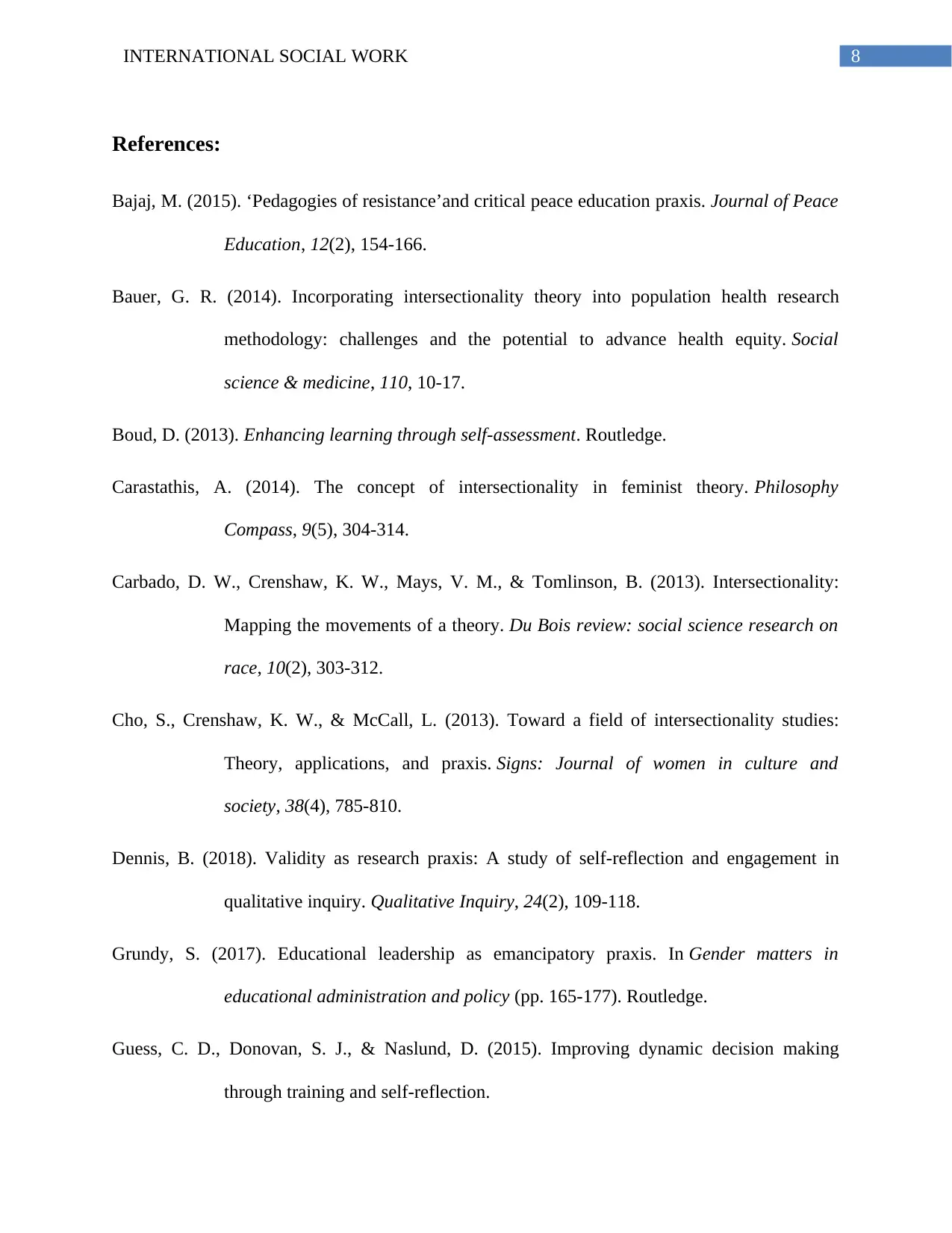
8INTERNATIONAL SOCIAL WORK
References:
Bajaj, M. (2015). ‘Pedagogies of resistance’and critical peace education praxis. Journal of Peace
Education, 12(2), 154-166.
Bauer, G. R. (2014). Incorporating intersectionality theory into population health research
methodology: challenges and the potential to advance health equity. Social
science & medicine, 110, 10-17.
Boud, D. (2013). Enhancing learning through self-assessment. Routledge.
Carastathis, A. (2014). The concept of intersectionality in feminist theory. Philosophy
Compass, 9(5), 304-314.
Carbado, D. W., Crenshaw, K. W., Mays, V. M., & Tomlinson, B. (2013). Intersectionality:
Mapping the movements of a theory. Du Bois review: social science research on
race, 10(2), 303-312.
Cho, S., Crenshaw, K. W., & McCall, L. (2013). Toward a field of intersectionality studies:
Theory, applications, and praxis. Signs: Journal of women in culture and
society, 38(4), 785-810.
Dennis, B. (2018). Validity as research praxis: A study of self-reflection and engagement in
qualitative inquiry. Qualitative Inquiry, 24(2), 109-118.
Grundy, S. (2017). Educational leadership as emancipatory praxis. In Gender matters in
educational administration and policy (pp. 165-177). Routledge.
Guess, C. D., Donovan, S. J., & Naslund, D. (2015). Improving dynamic decision making
through training and self-reflection.
References:
Bajaj, M. (2015). ‘Pedagogies of resistance’and critical peace education praxis. Journal of Peace
Education, 12(2), 154-166.
Bauer, G. R. (2014). Incorporating intersectionality theory into population health research
methodology: challenges and the potential to advance health equity. Social
science & medicine, 110, 10-17.
Boud, D. (2013). Enhancing learning through self-assessment. Routledge.
Carastathis, A. (2014). The concept of intersectionality in feminist theory. Philosophy
Compass, 9(5), 304-314.
Carbado, D. W., Crenshaw, K. W., Mays, V. M., & Tomlinson, B. (2013). Intersectionality:
Mapping the movements of a theory. Du Bois review: social science research on
race, 10(2), 303-312.
Cho, S., Crenshaw, K. W., & McCall, L. (2013). Toward a field of intersectionality studies:
Theory, applications, and praxis. Signs: Journal of women in culture and
society, 38(4), 785-810.
Dennis, B. (2018). Validity as research praxis: A study of self-reflection and engagement in
qualitative inquiry. Qualitative Inquiry, 24(2), 109-118.
Grundy, S. (2017). Educational leadership as emancipatory praxis. In Gender matters in
educational administration and policy (pp. 165-177). Routledge.
Guess, C. D., Donovan, S. J., & Naslund, D. (2015). Improving dynamic decision making
through training and self-reflection.
⊘ This is a preview!⊘
Do you want full access?
Subscribe today to unlock all pages.

Trusted by 1+ million students worldwide
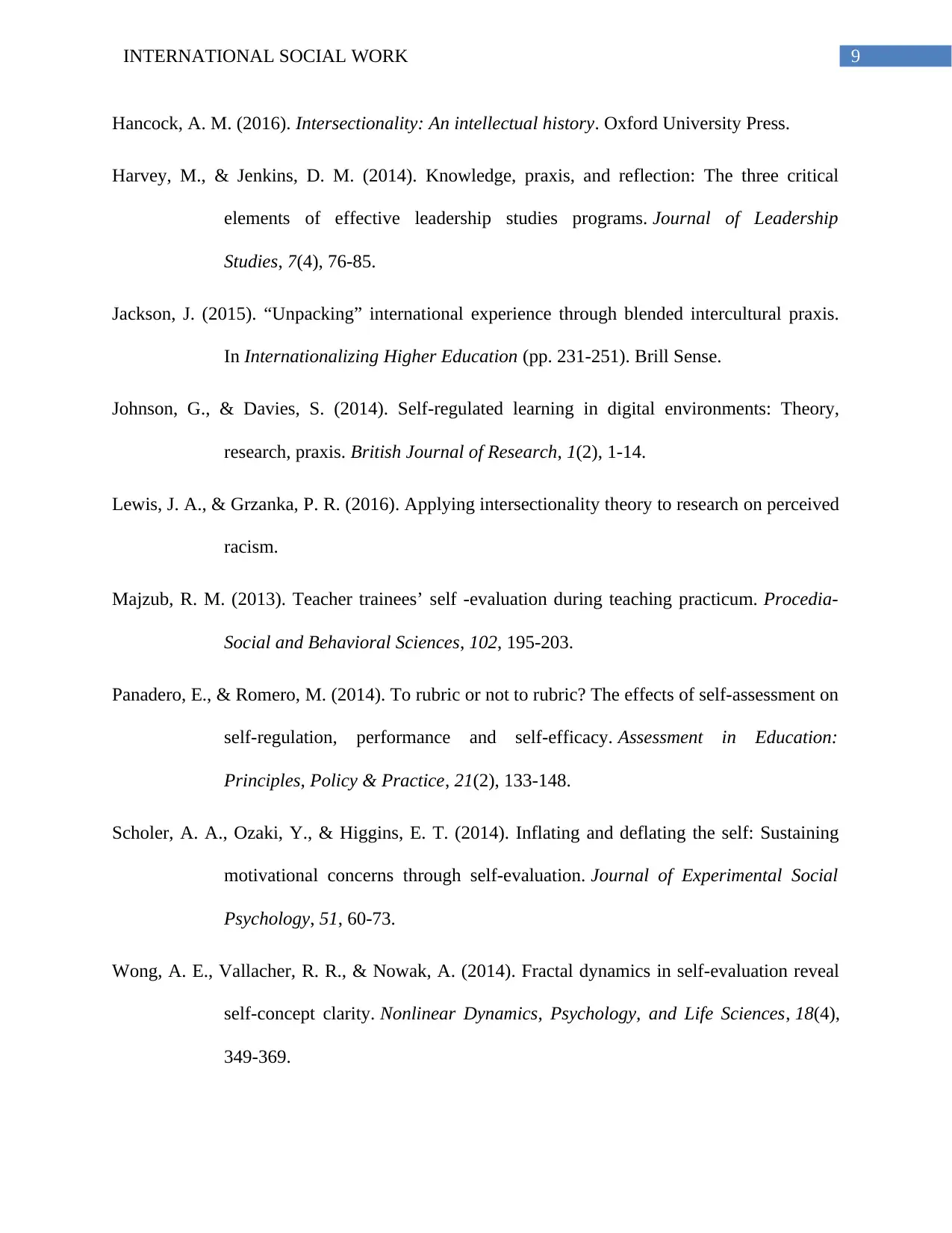
9INTERNATIONAL SOCIAL WORK
Hancock, A. M. (2016). Intersectionality: An intellectual history. Oxford University Press.
Harvey, M., & Jenkins, D. M. (2014). Knowledge, praxis, and reflection: The three critical
elements of effective leadership studies programs. Journal of Leadership
Studies, 7(4), 76-85.
Jackson, J. (2015). “Unpacking” international experience through blended intercultural praxis.
In Internationalizing Higher Education (pp. 231-251). Brill Sense.
Johnson, G., & Davies, S. (2014). Self-regulated learning in digital environments: Theory,
research, praxis. British Journal of Research, 1(2), 1-14.
Lewis, J. A., & Grzanka, P. R. (2016). Applying intersectionality theory to research on perceived
racism.
Majzub, R. M. (2013). Teacher trainees’ self -evaluation during teaching practicum. Procedia-
Social and Behavioral Sciences, 102, 195-203.
Panadero, E., & Romero, M. (2014). To rubric or not to rubric? The effects of self-assessment on
self-regulation, performance and self-efficacy. Assessment in Education:
Principles, Policy & Practice, 21(2), 133-148.
Scholer, A. A., Ozaki, Y., & Higgins, E. T. (2014). Inflating and deflating the self: Sustaining
motivational concerns through self-evaluation. Journal of Experimental Social
Psychology, 51, 60-73.
Wong, A. E., Vallacher, R. R., & Nowak, A. (2014). Fractal dynamics in self-evaluation reveal
self-concept clarity. Nonlinear Dynamics, Psychology, and Life Sciences, 18(4),
349-369.
Hancock, A. M. (2016). Intersectionality: An intellectual history. Oxford University Press.
Harvey, M., & Jenkins, D. M. (2014). Knowledge, praxis, and reflection: The three critical
elements of effective leadership studies programs. Journal of Leadership
Studies, 7(4), 76-85.
Jackson, J. (2015). “Unpacking” international experience through blended intercultural praxis.
In Internationalizing Higher Education (pp. 231-251). Brill Sense.
Johnson, G., & Davies, S. (2014). Self-regulated learning in digital environments: Theory,
research, praxis. British Journal of Research, 1(2), 1-14.
Lewis, J. A., & Grzanka, P. R. (2016). Applying intersectionality theory to research on perceived
racism.
Majzub, R. M. (2013). Teacher trainees’ self -evaluation during teaching practicum. Procedia-
Social and Behavioral Sciences, 102, 195-203.
Panadero, E., & Romero, M. (2014). To rubric or not to rubric? The effects of self-assessment on
self-regulation, performance and self-efficacy. Assessment in Education:
Principles, Policy & Practice, 21(2), 133-148.
Scholer, A. A., Ozaki, Y., & Higgins, E. T. (2014). Inflating and deflating the self: Sustaining
motivational concerns through self-evaluation. Journal of Experimental Social
Psychology, 51, 60-73.
Wong, A. E., Vallacher, R. R., & Nowak, A. (2014). Fractal dynamics in self-evaluation reveal
self-concept clarity. Nonlinear Dynamics, Psychology, and Life Sciences, 18(4),
349-369.
1 out of 10
Related Documents
Your All-in-One AI-Powered Toolkit for Academic Success.
+13062052269
info@desklib.com
Available 24*7 on WhatsApp / Email
![[object Object]](/_next/static/media/star-bottom.7253800d.svg)
Unlock your academic potential
Copyright © 2020–2026 A2Z Services. All Rights Reserved. Developed and managed by ZUCOL.





